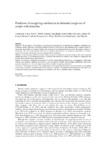| dc.contributor.author | Labra, Carmen de | |
| dc.contributor.author | Millán-Calenti, José Carlos | |
| dc.contributor.author | Buján, Ana | |
| dc.contributor.author | Núñez-Naveira, Laura | |
| dc.contributor.author | Jensen, Anders M. | |
| dc.contributor.author | Peersen, Merete Charlotte | |
| dc.contributor.author | Mojs, Ewa | |
| dc.contributor.author | Samborski, Wlodzimierz | |
| dc.contributor.author | Maseda, Ana | |
| dc.date.accessioned | 2015-11-23T12:41:20Z | |
| dc.date.issued | 2015-03-14 | |
| dc.identifier.citation | Labra C, Millán-Calenti JC, Buján A, Núñez-Naveiras L, Jensen AM, Peersen MC, et al. Predictors of caregiving satisfaction in informal caregivers of people with dementia. Arch Gerontol Geriatr. 2015;60(3):380-388 | es_ES |
| dc.identifier.uri | http://hdl.handle.net/2183/15583 | |
| dc.description.abstract | [Abstract] Objective. The prevalence of dementia is increasing and consequently the demands from families, institutions and healthcare system. Although a substantial amount of research on caregiving has emphasized the negative aspects of caregiving, specifically on caregiver burden and depression, less attention has been paid to the positive aspects of caregiving. The aim of the present work was to study the phenomenon of caregiving satisfaction in informal caregivers of people with dementia by assessing their likely predictors.
Methods. A stress process model was used to study caregiver's satisfaction (measured using the Revised Caregiving Satisfaction Scale) on 101 informal caregivers of patients with dementia in relation to the caregiver's background and context, stress-related factors, and mediators.
Results. The regression model has an adjusted R2 of 0.20, which indicates that having a consanguinity relationship with the care recipient, suffering from lower levels of subjective burden, and managing individuals with severe cognitive impairment are the most important predictors of higher caregiving satisfaction.
Conclusion. Interventions focused on the enhancement of the caregiving satisfaction by increasing the understanding of the disease, should be especially addressed to caregivers without a consanguinity relationship and with high levels of subjective burden, and to those managing care recipients with mild or moderate stages of dementia. | es_ES |
| dc.description.sponsorship | Ministerio de Industria, Energía y Turismo; AAL-2012-5-107 | es_ES |
| dc.language.iso | eng | es_ES |
| dc.publisher | Elsevier | es_ES |
| dc.relation.uri | http://dx.doi.org/10.1016/j.archger.2015.03.002 | es_ES |
| dc.rights | Creative Commons Licence | es_ES |
| dc.rights | Reconocimiento-NoComercial-SinObraDerivada 4.0 Internacional | |
| dc.rights.uri | http://creativecommons.org/licenses/by-nc-nd/4.0/ | |
| dc.subject | Positive aspects | es_ES |
| dc.subject | Predictors | es_ES |
| dc.subject | Burden | es_ES |
| dc.title | Predictors of caregiving satisfaction in informal caregivers of people with dementia | es_ES |
| dc.type | info:eu-repo/semantics/article | es_ES |
| dc.rights.access | info:eu-repo/semantics/openAccess | es_ES |
| dc.date.embargoEndDate | 2016-03-14 | es_ES |
| dc.date.embargoLift | 2016-03-14 | |






